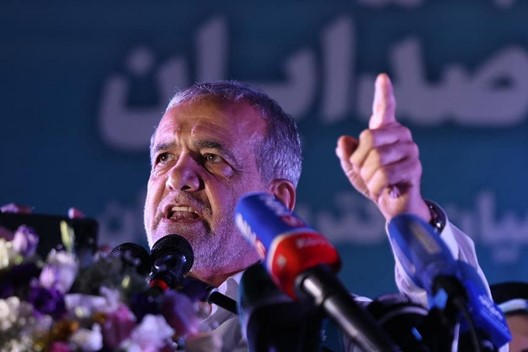Iran has elected a new president in a run-off election last week Friday. Dr Masoud Pezeshkian at age 69 is the oldest man to be elected the country’s second highest position after Supreme Leader of the Islamic Republic. Pezeshkian won the runoff against Saeed Jalili a hardliner. A former heart surgeon who served as a reformist politician who spent decades as a member of parliament and thereafter a cabinet minister. Pezeshkian is a man who spent his political career honing his survival skills. As a moderate in an arena dominated by hardliners, he will need those skills.
Pezeshkian was elected president last week Friday, beating his conservative opponent by a comfortable margin, but it was hardly a ringing endorsement. Less than half of Iran’s eligible voters even bothered to come to the polls, and just over a quarter cast a ballot for him. Overall, expectations are low, and Pezeshkian’s ambitions appear modest. “Pezeshkian is an ethical reformist who will try to deliver on his election promises – to the extent that laws and regulations permit,” Hassan Mohamadi, a professor of social sciences at the University of Tehran, told CBS news. In other words, Pezeshkian has no grand vision to reshape Iran’s authoritarian theocracy, or to challenge the supremacy of Ayatollah Ali Khamenei, the country’s conservative Supreme Leader, even though many Iranians long for just that.
Pezeshkian has to navigate the stormy, dark waters of Iran’s politics with the ordinary masses who voted for him on the one hand and the conservative ruling elite of hardliners on the other. Pezeshkian is well aware that he only has a slight mandate to govern from the Iranian people. Although more people voted in the run-off than in the actual election, it was still a low turn-out. However, the new voters voted exclusively for Pezeshkian. His main priority on the domestic front is to have sanctions lifted and grow the economy. Strengthening human rights while limiting the heavy handedness of the security forces will also be on the government agenda. To have it made into government policy will require the approval of Supreme Leader Ayatollah Khamenei. However, to undermine Khamenei and the Guardian Council’s authority could lead to Pezeshkian losing his eligibility for a second term.
Former (US) President Donald Trump, during his first tenure in the White House, took a hard line on Iran, unilaterally abandoning the international nuclear deal his predecessor fought hard to get Iran to agree to. On the programs and policies that have cased the most friction with the west, and which lie at the root of the sanctions – Iran’s missile program, processing of highly enriched uranium, support for the Houthis in Yemen, and support for Hezbollah and Hamas amid the latter group’s war with Israel in Gaza – Pezeshkian has made it clear that he’s firmly on regime’s side. In a letter to Hezbollah leader Hassan Nasrallah, the new Iranian president wrote, referring to Israel, that “Iran has always supported the resistance [Hezbollah] against the illegitimate Zionist Regime’s policies.”
The role of Pezeshkian as president of the Islamic Republic of Iran is to remain steadfast to the foreign policy set by Khamenei who as Supreme Leader has the final say on Iran’s foreign and defence policies. The Nuclear Deal as agreed by former US President Barak Obama was jeopardized by his successor Trump who did not want to make any concessions to Tehran or the government of then Iranian President Hassan Rouhani. Pezeshkian for his part will continue to support Khamenei and the Islamic Revolutionary National Guard Corpse in plans to supply the Houthis and Hezbollah with weaponry and financial aid. Washington’s closest allies Saudi Arabia, the United Arab Emirates, and others will not be happy with the continuity of this policy.
The enrichment of uranium is another point of concern as it brings Iran closer to developing nuclear weapons. The missile shield will be tip of the ice berg for Iran’s nuclear capabilities.
Dr Pezeshkianis is aware of the trauma and let-down felt so commonly by ordinary Iranians. He made this clear in his speech from (Ayatollah Ruhollah) Khomeini’s Mausoleum. “In this election, I didn’t give you false promises. I did not lie,” he said. “it’s been many years after the revolution that we come to the podium, we make promises, and we fail to fulfil them. This is the biggest problem we have.” But the new president and his administration will need to navigate the many layers of power that compose the complex state apparatus in Iran. At the moment, these institutions are dominated by the conservative right. Previous efforts to reform the political system – most notably under then President (Mohammad) Khatami in the early 2000s – were squashed by the conservative factions supported by the supreme leader, Ayatollah Ali Khamenei as the ultimate head of state.
The current regime in Iran is largely out of touch with what the ordinary people want. President Pezeshkian will have to navigate the anger and resentment of Iranians and a Supreme Leader whose office has gained so much power, that the Iranian Shahs (Kings) of old would pale in comparison. The IRNGC, the regular police, the morality police and Baseej are all under Khamenei’s thumb and it may matter more who his successor will be. Pezeshkian has his work cut out for him. As a supporter of former president Rouhani, he wants to revive the nuclear technology deal with the United States and the North Atlantic Treaty Organization (NATO). This could require Tehran to make concessions of its own.
The negotiations with the Western powers will be a journey that has its own hazards. The problem is that with a weakening China and an increasingly isolated and hostile Russia as Iran’s only major allies, Pezeshkian will have to establish a new lifeline with the west. Europe in particular would be the key. The Saudis for their part being the other one of three power houses in the region, with Iraq taking up a key space might be tempted to continue to pursue the development of their own nuclear program and arsenal. Pezeshkian for his path must steer the ship of Iranian domestic and economic policy under Khamenei’s tutelage through stormy waters.
Article written by:
Yacoob Cassim
Journalist at Radio Al Ansaar






